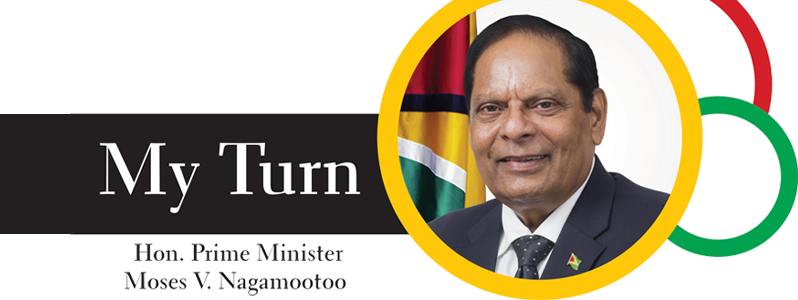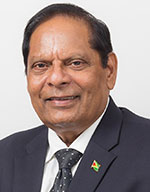THE Guyana police have charged three persons with multiple counts of murder, arising from the recent piracy-related massacre of mostly Guyanese fishermen off the coast of Suriname. The alleged mastermind and his co-accused, as well as the third murder accused, are all from Upper Corentyne. Upon conviction, they face the penalty of death by hanging.
Thirteen other persons remain in police custody in Suriname, and could also face piracy and murder charges in that jurisdiction.
The question that has been raised is whether the three murder accused should be charged in Guyana for offences committed in Suriname.
The answer is found in provisions of the Hijacking and Piracy Act (2008), for offences, though committed in another country, to be treated as if they were done within Guyana or its territorial waters. In other words, as advised, Guyana has jurisdiction.
TWO GRUESOME ATTACKS
During April-May this year, two separate attacks took place against five Suriname-registered fishing vessels, both with some 25 crew members – mostly Guyanese. Nine fishermen survived in the grisly, gruesome blood-bath; 12 are still missing, and are presumably dead. Of the four dead, two were Guyanese.
There are several theories surrounding the attacks, one being a vengeance vendetta for the execution-style killing of a Guyanese fishing king-pin. Whatever the motive, I wish to remind all fishing folk and their hired hands that offences at sea carry serious penalties, which include:-
* Life imprisonment for hijacking, that is, taking away or attempting to take away another boat;
* Life imprisonment for piracy, that is, illegally detaining a boat in a river or on the sea; or participating in the operation of a pirate vessel;
* 10 years imprisonment for covering up a piracy attack, where death resulted; and
* Death by hanging, for murder on board a vessel during an armed robbery, hijacking or piracy.
Fishing crew who sign on to work on a “pirate boat”, whether in Guyana, Suriname or elsewhere, cannot claim that they do not know the law; or plea that “is dem; not me!”
KNOWN GANGS
This message, it appears, has been conveyed to fishing gangs on the Upper Corentyne who, people say, are known to have been involved in hijacking and piracy off the coast of Guyana and in the Corentyne River.
Here, I want to commend my colleague, Khemraj Ramjattan, now a vice-president and Minister of Public Security, who has been a reputable public prosecutor, police adviser and criminal defence lawyer. He has a nose for the culprits and, not being his usual combative self, he had quietly sent the message to would-be offenders that the police have them on their radars.
While it may be too early to boast, it must be admitted that so far there has been not a single act of piracy or hijacking in Guyana for 2018. In fact, there have been no reported cases of piracy in the East Berbice-Upper Corentyne Region since 2016. There have been 10 reported cases in the Waini River, in the border area with Venezuela, mainly involving “shake-downs” of Guyanese miners by elements believed to be Venezuela-based “Sindicatos”.
VAST COASTLINE
It has always been a challenge for Guyana to monitor its vast coastline that stretches for 270 nautical miles from Morawhanna at the mouth of the Barima river, to Corriverton in the mouth of the Corentyne river. However, with the advent of the coalition government, keen attention has been placed on border security, including monitoring of our fishing and maritime areas.
The Maritime Wing of the Guyana Police Force, the Customs and Anti-narcotics Unit (CANU) and the Guyana Defence Force have coordinated both patrols by boat and air, which are costly exercises but are necessary to protect our food-based economic activities, combat trafficking of illicit drugs, fuels and other contraband, and to protect state revenues.
ENCOURAGING RESULTS
The police force has pursued all cases of piracy with vigour and has produced encouraging results in the number of cases instituted. This has not always been the case, as pirates and bandits have been left on the loose before the new government took office in 2015.
I have asked Crime Chief Paul Williams to give me relevant statistics and he reported that between 2010 and 2014, there were 52 cases of piracy and hijacking, but only 20 cases were made out. I have no information as to how many of those resulted in successful prosecutions.
Making criminals at sea pay for their crimes must be a cornerstone of our justice system. I am not one of those who take pleasure in shouting “hand dem high!” but deterrents are important, which is why Guyana remains a death penalty country.
DESMOND PERSAUD
I remember when kick-down-the-door banditry was prevalent during the mid 80s, President Desmond Hoyte re-activated hangings, and thereafter there was a dramatic plunge in the morbidity statistics. Even his most dedicated critics applauded him; and a certain ethnic constituency that had previously declared no apparent admiration for the President, nicknamed him “Desmond Persaud”.
There have been no executions since 1997 and efforts to persuade President Cheddi Jagan to sign death warrants had failed. He had repeatedly said that he would have no one’s blood on his hands! President Granger has since declared a similar position.
During Jagan’s tenure, there were over 30 convicted felons on death row, but most of them had petitions filed on their behalf with the United Nations Human Rights Commission and elsewhere, where the death penalty was viewed as cruel and inhumane. I recall when calls were made to swing the rope in the Yasseen Murder case, those were frustrated as legal procedures had not been exhausted. The convicted murderer, Abdool Yasseen, later died in prison for plotting the murder of his own brother – a kind of poetic justice!
PUBLIC POLICY DEMANDS
Philosophically, I believe that Guyana will change with the times and would be inclined to interpret certain articles of our constitution in line with relevant fundamental rights guarantees of international law and conventions on human rights. But there ought to be recognition of public policy demands and the law, as is, that favour punishment that fits the crime.
I have no doubt that in the near future Guyana would be influenced and, hopefully adopt, liberal practices in several areas of our human rights. Our presence on the United Nations Human Rights Committee will have consequential impact on our jurisprudence and, it gives me honour to applaud the appointment of the eminent jurist and legal scholar, Dr. Christopher Arif Bulkan, a Guyana-born appellate judge, as a member of this prestigious UN body.




.png)









